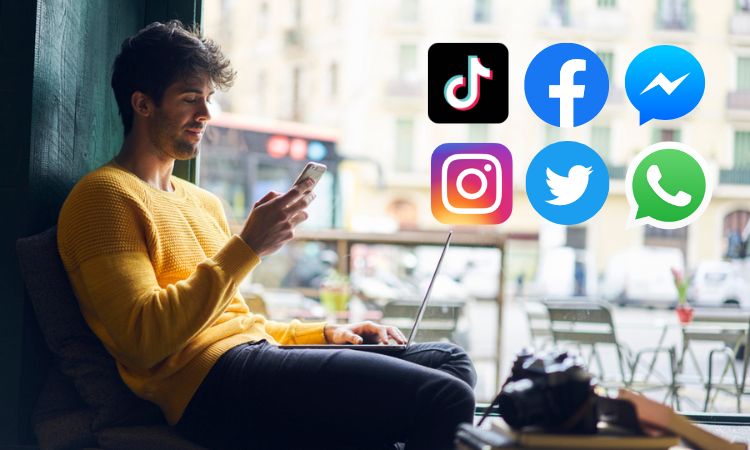Impact of social media on Mental Health

The impact of social media on mental health has gained increasing attention in the fast-paced world of modern living. Social media has a deeper effect on us than just the obvious tension and exhaustion; it has an emotional and physical impact. It is more than just fatigue from a long day; it seeps into all facets of our existence and lessens the joy, vigour, and purpose they provide.
A more thorough analysis of social media’s complex features is necessary to comprehend the relationships between it and mental health. It’s not just that we’re exhausted after a long day of social media use; it’s a pervasive tiredness that changes the way we interact with the outside world. Social media can make us feel detached and take us away from the enjoyment and interaction of life.
As we delve deeper into this investigation, it becomes critical to identify the warning signals, understand the underlying causes, and accept the significant influence social media can have on our mental health. This journey asks us to navigate this changing world with mindfulness and awareness as it takes a detailed look at how these digital platforms impact our ideas, emotions, and overall well-being.
Causes & Effects :
Recognizing the diverse causes, ranging from comparison culture to cyberbullying and social media addiction, is essential for effective understanding and treatment of the consequential impact on mental health.
- Social Comparison Culture: A virtual battle for self-worth has emerged as a result of frequent exposure to social comparison culture on social media platforms. People’s feeling of value connects with their quest of likes, shares, and following as they traverse their digital lives. This ubiquitous comparison culture creates a complex dynamic that affects mental health by elevating virtual validations above real validations and cultivating emotions of inadequacy.
- Cyberbullying and Online Harassment: Social media anonymity frequently encourages bad behaviour, which deepens the murky world of cyberbullying. Being anonymous online gives one a sense of confidence that might be dangerous for one’s mental health. Establishing a setting that protects users from the harmful impacts of online harassment requires developing and advocating social media safety guidelines.
- FOMO: The constant barrage of highlight videos on social media feeds exacerbates FOMO (fear of missing out) and compare anxiety. Constant exposure to allegedly perfect lives can make one feel more anxious and inadequate. Getting around in this environment requires making a conscious effort to break free from the never-ending comparison game and cultivate an attitude that prioritizes real development over made-up accomplishments.
- Social Media Addiction: As our digital footprint grows, worries regarding social media addiction are becoming more and more pressing. Stress levels can rise and sleep cycles can be disturbed by the constant need to check messages and update statuses. It is critical to identify the tell-tale signs and symptoms of social media addiction, which leads to the creation of a digital detox plan aimed at re-establishing a more balanced relationship between screen time and health.
Prevention :
In the era of social media, taking proactive measures is crucial to ensuring our wellbeing.
- Mindful Consumption Practices: To avoid the onset of social media addiction, mindful consumption is encouraged through the promotion of breaks and screen time limits. One way to help people have a healthy relationship with social media is to spread knowledge about good digital practices. By lowering stress levels and avoiding sleep disturbances, this preventive technique seeks to promote a more sustainable and thoughtful online experience.
- Creating Resilience Against Comparison: The secret to creating resilience against the detrimental impacts of social comparison is to cultivate intrinsic value, independent of virtual validations. People’s feeling of identity is strengthened when self-worth is emphasized in ways other than through internet compliments. By guarding against the traps of continual comparison, this preventative action seeks to strengthen people’s mental toughness.
- Strengthening Privacy Measures: Improving privacy measures is necessary to provide people more control over their online persona. The risk of online harassment can be reduced by giving people the resources they need to properly maintain their online privacy. Increasing the privacy settings is a preventive step that makes the internet a safer place where people may interact without worrying about harmful activity.
- Self-Reflection and Digital Detoxification: Promoting self-reflection enables people to identify the warning indicators of social media addiction. Restoring a healthier balance between online and offline experiences requires deliberate efforts toward periodic digital detoxification. Disconnecting proactively can help people reduce the possible harmful effects of excessive digital interaction and improve their mental health.
Conclusion :
To summarize, understanding the digital maze of social media’s impact on mental health requires purposeful actions and careful consideration of options. Striking a balance involves addressing issues like cyberbullying, social comparison, and FOMO while fervently promoting positive engagement and digital detoxification methods. In this day of continual connectedness, let us prioritize mental health and strive to live in harmony with both our online and offline environments as we navigate the digital landscape.
